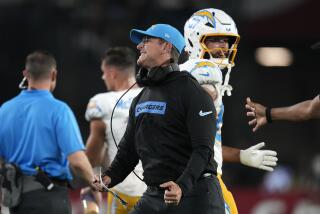Man-to-Man Defense Is Fatal to Chargers
- Share via
SAN DIEGO — All day long, the Charger secondary had suffered whiplash from futilely watching passes go beyond it for long gains.
So, when the Redskins began a drive from their 31 with two minutes remaining, logic may have dictated a prevent defense.
Ron Lynn, Charger defensive coordinator, dictated otherwise.
With the Chargers leading, 27-23, Lynn gambled that his team wouldn’t be beaten long again. He ordered man-to-man coverage.
The gamble proved to be a poor bet. Again, the Charger defense gave up big gains. Washington covered 69 yards in 3 plays and won, 30-27.
“Maybe it’s inexcusable to be in that coverage,” Lynn said. “Maybe we should have played a three- or four-deep zone. That would have left us vulnerable in other areas. In retrospect, it might have worked better.”
Charger defenders were not about to second-guess their coach.
Rookie cornerback Donald Brown, making his first start, simply commented that what the boss says goes. Free safety Gill Byrd was stronger in his support of Lynn.
“I think it was a good call,” Byrd said. “I don’t think you can just sit back and let Washington, with its skilled people, march down the field.”
Instead, the Chargers let Washington sprint down the field.
On first down, cornerback Wayne Davis batted down a long pass intended for Art Monk. On second down, Davis wasn’t as fortunate.
Washington’s Jay Schroeder threw long again, connecting on a 55-yard sideline pass to Gary Clark beyond Davis at the Charger 14. Davis, for the second straight play, was in man-to-man coverage.
“We were looking for the deep ball,” Davis said. “We play a bump (at the line of scrimmage) defense, so you are even from the line. Most of the time, the receivers will have a step on you. You just have to play the ball.
“When the ball was thrown, I was turning around. I looked up and couldn’t find the ball. All of a sudden, I saw the ball and it was too late.”
Davis was hoping for help from the safeties.
“I’m responsible for the deep post of 15 yards or more,” Byrd said. “It’s hard for the safety to make a play on either sideline coming from the middle of the field.”
The next play, Clark again beat San Diego’s defense. Despite not hearing the play called in the huddle, Clark caught a 14-yard touchdown pass from Schroeder with 1:16 to play.
The Chargers were playing what they call a bracket defense. Clark caught the ball between Brown and Byrd.
“If he goes outside, I take him,” Brown said. “If he goes inside, Gill takes him. He didn’t commit either way. That’s one of those routes you chalk up to experience. There’s no coverage for that.”
The Chargers were unable to cover Washington’s receivers all afternoon. Schroeder completed 16 of 36 passes for 341 yards and a touchdown, oftentimes picking on cornerbacks Brown and Davis.
Clark caught 6 passes for 144 yards and a touchdown. Monk caught 7 for 174 yards.
“We gave up too many, just too many, big plays,” Lynn said. “There were mental and physical errors on our part. There was lack of intensity and lack of poise. There were bad (coaching) calls. Add ‘em up. They all amount to the same thing.”
Early on, the Chargers previewed a sign of things to come.
On third down from San Diego’s 12, Clark was wide open in the corner of the end zone but was overthrown by Schroeder. According to Brown, he and Davis did not communicate on the play.
Later in the half, Charger defenders weren’t so lucky.
On a third and 10 from San Diego’s 41, Davis deflected a pass into the arms of Monk at the three. George Rogers scored two plays later.
“I was trying to catch it,” Davis said. “That’s not necessarily a mistake. When the ball is in the air, your natural instinct is to try for an interception. If I would have caught it, it would have been a great interception.”
In the third quarter, Charger cornerbacks watched Monk race beyond them. Monk caught a 41-yard pass behind Davis and a 58-yarder behind Brown.
There was more of the same in the fourth quarter.
From Washington’s 23, Schroeder threw an intended 46-yard pass for Clark. Brown was called for pass interference.
However, the Chargers recovered a fumble two plays later.
The next drive would result in Washington’s winning touchdown. There were no crucial plays by the Chargers this time.
“People will say it’s the same old thing,” Byrd said. “I don’t think it’s the same old thing. I think we are an improved defense. We still give up the big plays too much.”


